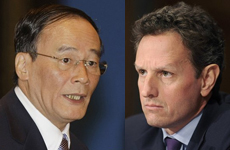Wang, Geithner exchange views on economic relations
|
|
|
File photo: Chinese Vice Premier Wang Qishan (L) and U.S. Treasury Secretary Timothy Geithner (R). |
Vice-Premier Wang Qishan met US Treasury Secretary Timothy Geithner in the Chinese capital on Thursday and discussed economic ties.
In a brief statement after their meeting, the Treasury Department did not say whether the two sides discussed currency issues.
The Chinese Ministry of Finance could not be reached for comment.
Geithner had been expected to press Washington's case for Beijing to ease exchange rate controls that critics alleged distorted trade.
Geithner, who stopped in Beijing after a two-day visit to India, left for Washington after the meeting.
A Treasury official in Washington said Geithner and Wang met for 75 minutes in the VIP terminal of the Beijing Capital International Airport, each accompanied by a single aide. Geithner had first stopped in Hong Kong.
Despite the official silence, a late advance in the yuan in Shanghai to 6.8235 per dollar, the strongest rate since October 2009, fueled talk that change was afoot.
The decision to hold such a high-level encounter suggested that Washington and Beijing are trying to narrow their differences over currency that threaten to overshadow cooperation on the global economy, Iran's nuclear program and other issues. "The two sides exchanged views on US-China economic relations, the global economic situation and issues relating to the upcoming economic track dialogue of the second US-China Strategic and Economic Dialogue, to be held in Beijing in late May," the Treasury statement said.
Chinese Foreign Ministry spokeswoman Jiang Yu declined before the meeting to elaborate on the agenda, saying only that Wang and Geithner would "exchange ideas on US-China relations and other issues of mutual interest".
The Obama administration delayed a report to the US Congress due April 15 in which it had the option of citing Beijing as a currency manipulator, a designation that could lead to a World Trade Organization complaint and possible trade sanctions.
Economists expect Beijing to allow the yuan to rise as early as the second quarter of this year in order to ease strains in its own economy. A stronger yuan would increase the buying power of Chinese consumers, helping to increase domestic consumption and reducing reliance on exports.
"China can go a lot further in internationalizing its economy and promoting world growth by making its currency more flexible," said Pieter Bottelier, an economist and former head of the World Bank's China office.
"It is in the interest of the Chinese to resume its policy of pushing toward a more flexible exchange rate, rather than in the interest of the US".
"If China's currency appreciates very significantly in a short time it would not be a good thing and it would raise costs for US consumers," said Xia Bin, director general of the Financial Research Institute of the Development Reform Council, a body affiliated with the country's Cabinet. Xia advises the government on monetary policy.
"We need to pursue an independent currency regime, and I believe in the long term we will see the exchange rate floating more," Xia said.
While the talks on Thursday were seen as a positive development, analysts were not expecting any significant new agreement to come out of the visit.
 0
0 








Go to Forum >>0 Comments